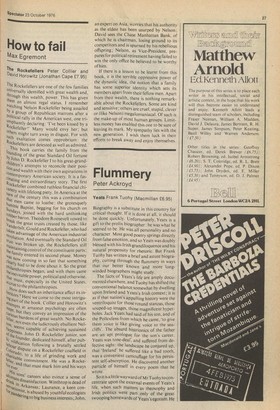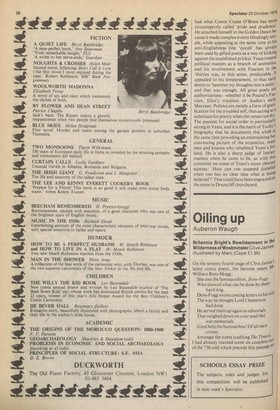Flummery
Peter Ackroyd
Yeats Frank Tuohy (Macmillan £6.95) Biography is a substitute in this country for critical thought. If it is done at all, it should be done quickly. Unfortunately, Yeats is a gift to the prolix biographer : he was what he seemed to be. He was all personality and no character. Most good poetry springs directly from false emotion, and so Yeats was doubly blessed with his Irish grandiloquence and his natural propensity for rhetoric. But Frank Tuohy has written a brief and astute biography, cutting through the flummery in ways that our better known and more longwinded biographers might study.
The facts of Yeats's life are amply documented elsewhere, and Tuohy has shifted the conventional balance somewhat by dwelling upon Ireland and Yeats's Irish context; it is as if that nation's appalling history were the ventriloquist for those rotund stanzas, those souped-up images, those magnificent hyperboles. Jack Yeats had said of his son, and of the Pollexfens from which he came, 'to give them voice is like giving voice to the seacliffs'. The absurd histrionics of the father are an apt prologue for the son's career. Yeats was tone-deaf, and suffered from defective sight : the landscape he conjured up. that 'Ireland he suffered like a bad tooth, was a convenient camouflage for his persistent self-absorption. He discovered another particle of himself in every poem that he wrote.
So it is a little wayward of M r Tuohy toconcentrate upon the external events of Yeats's life, when such matters as theosophy and Irish politics were part only of the great swooping homewards of Yeats's egotism. He
had what Conor Cruise O'Brien has more circumspectly called 'pride and prudence. He attached himself to the Golden Dawn because it made complex events blindingly simple, while appealing at the same time to his anti-Englishness (the 'occult' has always been used by gifted poets as a way of kicking against the established pricks). Yeats treated political matters as a branch of aesthetics, and his involvement with Fascism in the 'thirties was, in this sense, predictable. It appealed to his temperament, to that early desire to 'hammer my thoughts into a unity and that was enough. All great poets are authoritarians--whether it be Pound's Fascism, Eliot's royalism or Auden's early Marxism. Politics are merely a form of gratiheat ion for the troubled self, thus acting as a substitute for poetry when the verses run dry. The passion for social order is particularlY strong in Yeats, and it is the merit of TuohY s biography that he documents this while at the same time providing an entertaining but convincing picture of the eccentrics, mad' men and knaves who inhabited Yeats's Ireland. He is also a sharp judge of literary matters when he cares to be, as with this comment on some of Yeats's more obscure stanzas: 'How can one suspend disbelief when one has no clear idea what is being believed T That could have been engraved orl the stone in Drumcliff churchyard.











































 Previous page
Previous page